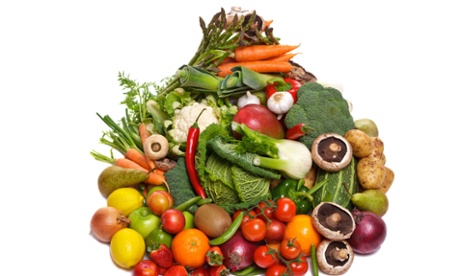
Will eating more fruit and vegetables make me thin?
Want to get thin? Eat more fruit and vegetables – they’re a low-calorie way of filling up, right? The health site WebMD has “eat more fruit and vegetables” as one of its “22 best diet tips ever” and the next US Dietary Guidelines are likely to push a “healthy Mediterranean-style diet”, big on plant-based food, to avoid more people becoming super-sized. But dietary advice being notoriously fickle, a research paper in this month’s PLOS Medicine says that eating more fruit and vegetables doesn’t necessarily help weight loss: it depends which ones you eat. Eating starchy vegetables such as corn and potatoes (boiled, mashed or baked – the amount of butter added unknown) was linked to weight gain. Eating more high-fibre, lower-glycemic vegetables such as broccoli and brussels sprouts was associated with weight loss. Lower-glycemic foods do not raise blood sugar levels as much as higher ones. So should you stick to non-starchy vegetables and is most fruit still a slimming aid?
The solution
The study, from Harvard University, looked at changes in the intake of specific fruit and vegetables recorded in the dietary questionnaires of 133,468 US men and women over 24 years. It took into account other lifestyle factors that affect weight, such as smoking, amount of sleep, hours watching television and exercise. Dr Monica L Bertoia, the lead author, says that, in America, the most common choices of fruit and vegetables are orange juice and potatoes. “There are many fruits and vegetables that may be better choices for the prevention of weight gain, such as apples, pears, berries and non-starchy vegetables,” she says.
The idea of eating more fruit and vegetables to lose weight only works if you eat less of something else – all calories count. A study last year from the University of Alabama, looking at previous research on weight loss and increased fruit and vegetable intake in more than 1,200 people, found that people who didn’t reduce their calorie intake overall did not lose weight.
Different fruit and vegetables have different characteristics – lower-glycemic foods cause fewer and smaller blood sugar spikes and may reduce hunger. So if you want high-fibre, low-glycemic fruit, go for blueberries and avocados. Strawberries are low on fibre but good on the low-glycemic scale, as is grapefruit – unless you pour sugar on it. Pears and apples came out well, even though they have a high-glycemic index – their higher fibre may compensate. For vegetables, try sprouts (without crispy bacon), broccoli, tofu, cauliflower and sweet potatoes or yams rather than potatoes. But remember, they all still have calories.

